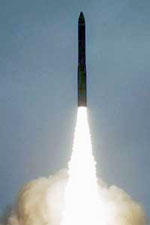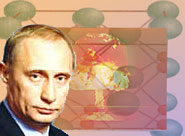|
With Russia already facing enormous financial difficulties and its own domestic fight against terrorism, it would appear to be a strange time for the country to be thinking of channelling massive amounts of funding into nuclear arms. In that light, some people are asking whether this might be clever posturing on Mr Putin's part.
To find out more about President Putin's plans, and how the United States is likely to react, Radio Netherlands spoke to nuclear expert Paul Leventhal:
"Well, it comes as something of a surprise because he has identified the terrorist threat to Russia as being paramount, and then all of a sudden he seems to be making threatening statements with regard to the strategic nuclear arms race. So why this is happening at this moment is perhaps hard to figure out, except that it could be an attempt to position Russia more favourably in terms of what ever demands it might be making of the United States with regard to financial assistance or any number of other things on the US-Russian agenda. It would just seem to be the wrong time for Russia to be engaging in this kind of a build-up given its financial difficulties and the terrorism threat that Putin himself has labelled as number one."
RN: "Can we go as far as describing this as Moscow starting some kind of arms race with Washington?"
 |
| Russia's Topol-M missile |
|
Russia has been modernising its nuclear weapons arsenal since the end of the 1990s. The country now has some 40 Topol-M or SS-27 missile systems, with a further five to be added next year. The modernisation process is slow and costly, which begs the question of whether Russia can afford to develop an even more advanced and - as claimed - extremely fast missile system. It would appear that President Putin's plans refer to the warhead carried by the Topol-M. The new missile could carry a MARV nuclear warhead. After re-entry into the earth's atmosphere, a MARV warhead would be able to change direction and thus foil a US missile defence shield. The Russians test launched a MARV in the air in 1998, but no information is available about its current state of development. |
"My hope is that this will pass after some discussion between the United States and Russia. But if not, then it suggests that the United States has to put arms control and disarmament on a much higher plane than it has heretofore."
RN: "So, we're unlikely to see an immediate response from Washington, but does this situation have the potential to develop into something more serious?"
"I think so, and therefore it has to be taken seriously. But the relationship between Bush and Putin has been pretty good, and presumably they will try to have a discussion to work things out. I would just emphasize that although non-proliferation is extremely important now because of the nuclear terrorism threat, we cannot ignore the need to continue the disarmament process with Russia rather than to stumble into anything that could trigger a new nuclear arms race, because if we engage in a new nuclear arms race than that will be a signal to other countries, especially Iran, for example, or North Korea, that what is good for the goose is good for the gander, and could set an unfortunate example."

 Send this page to a friend
Send this page to a friend